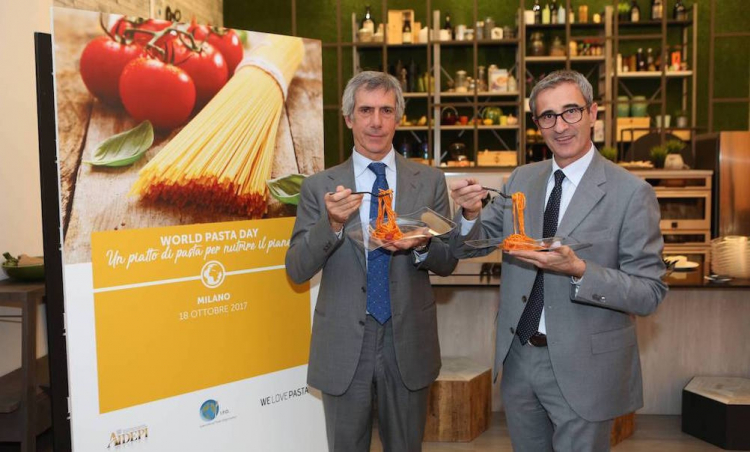Today it’s the World Pasta Day 2017, the 19th edition of a yearly event whose media relevance continues to increase after the debut in 1998. Each year the festival organised by Aidepi (Associazione industrie dolce e pasta italiane) and Ipo (International pasta organisation) changes location. It’s now the turn of Brazil, a country where consumption is rapidly growing. Two hundred and fifty representatives, what with pasta producers, institutions, scientists, journalists and food opinion leaders are awaited.
Pasta industry professionals will discuss important data that is worth recalling here: between 1997 and 2016 global pasta production has increased by almost 57%, moving from 9.1 to 14.3 million tons. There are 48 countries (+77%) producing significant quantities (over 1000 tons) and 52 (they were 30 then) where per capita yearly consumption is at least 1 kg. Italy leads the producers’ market: 1 pasta dish out of 4 eaten worldwide is made by an Italian pasta factory.

Paolo Barilla and Riccardo Felicetti, respectively neo-president and departing president at Ipo, the International Pasta Organisation
This year, pasta producers are launching a challenge “a dish of pasta to feed the planet”. This means they will donate over 3 million pasta dishes as part of “The Power of Pasta” project. Indeed, according to "The State of Food Security and Nutrition in the World 2017”, a UN report edited by the Fao, the Ifad and the World Food Programme, in 2016 hunger increased once again after a decade of decline. It now plagues 815 million people, +38 million compared to 2015, 11% of the world population. The ambassadors of this charity activity will be: Neapolitan
Antonino Cannavacciuolo, American
Bruno Serato and Brazilian
David Hertz.
Meanwhile, in Italy, on the 23-28th October, 7 pasta factories will open their doors to the public to share the secrets of their production:
Divella in Rutigliano (Bari),
Felicetti in Predazzo (Trento),
Barilla in Pedrignano (Parma) and Foggia,
Garofalo in Gragnano (Napoli),
La Molisana in Campobasso and
Rustichella d’Abruzzo in Pianella (Pesaro).
«Even though carbo-phobia is widespread», says
Riccardo Felicetti of
Monograno Felicetti, departing president at
Ipo, the
International Pasta Organisation, «pasta is and will be for a long time the food Italians love the most, and not only Italians. This because it has many features other food lacks: it can be shelved for a long time, and in different conditions, it has character, versatility, as it can be matched with all sorts of sauces, it is sustainable because wheat cultivation has a very low impact on the environment, it is healthy because it has nutrients difficult to match. On top of this, it doesn’t go against any ideology or religion. In fact, it is a synonym of conviviality and brotherhood».
«For these reasons, I expect that the focus in Sao Paulo will be on these features. Facts are our best defence. I will follow the day from Italy, celebrating with some lovely spaghetti».
Translated into English by Slawka G. Scarso